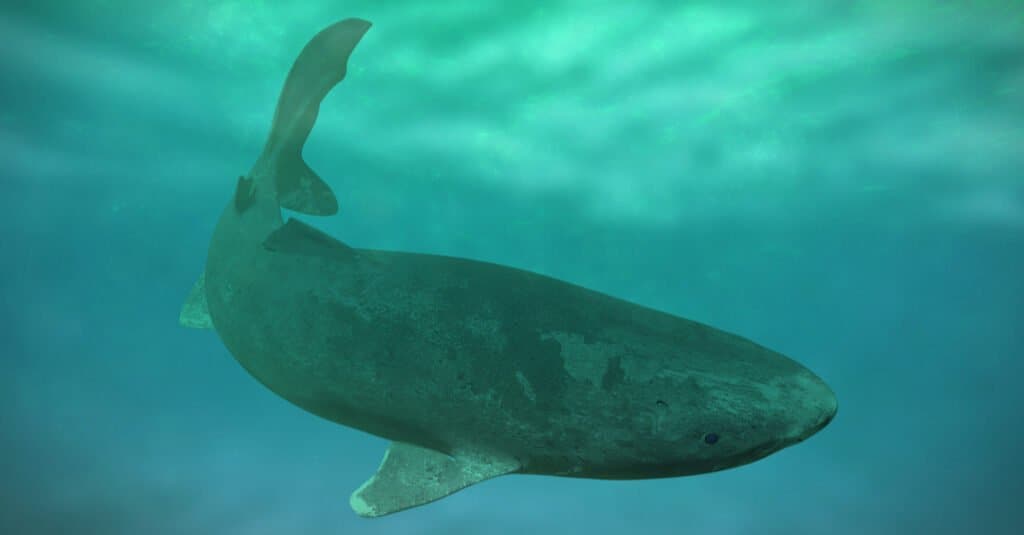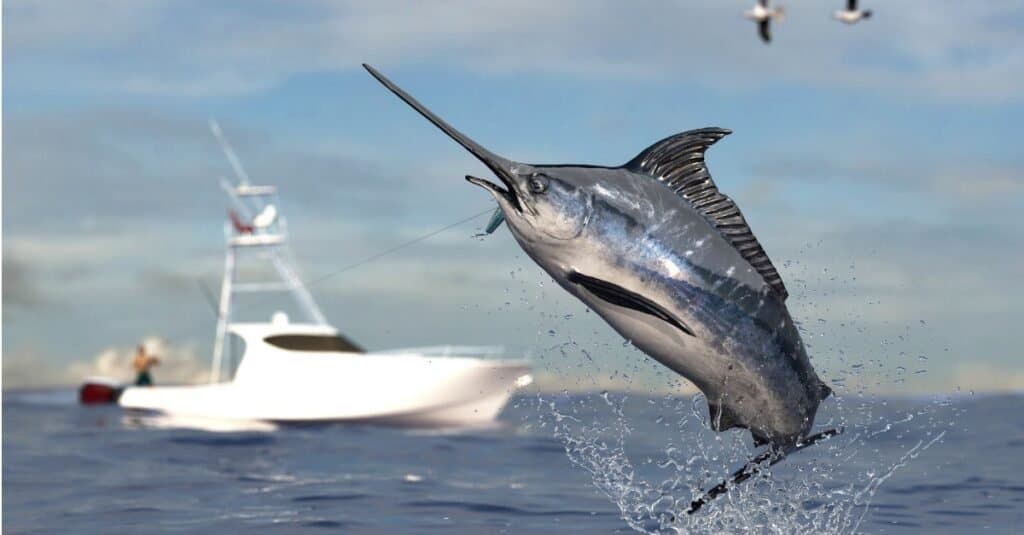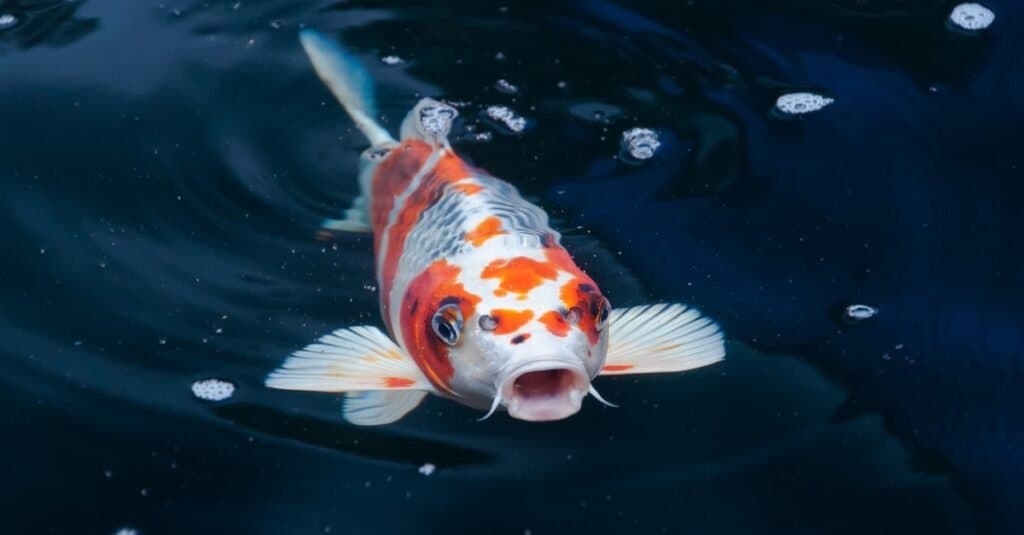With over 30,000 different species of fish, the ocean is filled with a colorful display of incredible sea creatures. Fish are vertebrate animals and while they were originally thought to be unintelligent due to their small brain size, scientists now recognize them as sentient creatures. Capable of socializing and communicating with other fish, these sea creatures even predate the dinosaur era. So exactly how old is the world’s oldest fish? We’ll uncover the oldest fish in the world and see how they compare to other aquatic animals.
When Did Fish First Appear on Earth?

The world’s oldest fish is the Greenland shark, which can live 392 years.
©Dotted Yeti/Shutterstock.com
Fish are vertebrates, an animal with a backbone that has adapted to life underwater. Today, there are more species of fish on earth than all the species of mammals, birds, reptiles, and amphibians, combined. In fact, fish have been around for more than 450 million years, making them essential to earth’s aquatic ecosystems. Compare that to the lifespan of mammals that have only been on earth for roughly 200 million years.
Fishes are classified into three groups: superclass Agnatha (jawless fishes), class Chondrichthyes (cartilaginous fishes), and superclass Osteichthyes (bony fishes). Despite their differences, all fish share specific characteristics that distinguish them from all other life.
These include having a backbone, using gills to breathe oxygen, having scales to protect their bodies, fins for swimming, and being cold-blooded.
However, there are exceptions to these definitions of fish, which include the opah, which is a warm-blooded fish, and lungfish which use lungs instead of gills to breathe.
Fish are able to live in many bodies of water, including freshwater lakes and rivers as well as saltwater oceans. With so many different types of fish in the ocean, there are some that are less than one-centimeter long while others, such as the whale shark, can reach beyond 15 meters (50 feet) long and weigh 15 tons.
In their natural habitat, fish spend a majority of their time hunting for and grazing on food and many fish are fast swimmers as well. Some of the fastest swimmers include marlin who can swim at 50 miles per hour and sailfish which can reach 68 miles per hour.
Fish Lifespan: How Long Do Fish Typically Live?
The average lifespan of fish range from 5 years to up to 100 years, some exceptional species living well beyond the age of humans.
With so many different types of fish in the world, this answer to how long they live depends on a few factors. To begin with, each species of fish has a different average lifespan. The average lifespan also varies depending on whether they are a freshwater or saltwater fish as well as the quality of the natural habitat where they reside.
In the wild, fish are able to grow quite old. Some freshwater fish, such as the lake sturgeon of the Great Lakes can reach around 100 years. Paddlefish have been recorded to live around 55 years old while freshwater game fish only live to about 6-8 years depending on the availability of food and water temperature.
In comparison, the ocean has been home to a wide variety of fish for many millions of years and has been known to have some of the longest-lived species of fish. The lifespan of sailfish is around 5 years, but they are capable of living for up to 13-15 years. Red drum can live up to 60 years, while mahi-mahi only lives between 4 to 5 years.

Fish lifespans generally span from 5 to 100 years of age.
©iStock.com/bbevren
The World’s Oldest Fish
The oldest fish in the world is the Greenland shark, with a 392-year-old female specimen being the oldest ever discovered. With a lifespan of at least 272 years, Greenland sharks are now the longest-living vertebrates known on Earth, according to scientists.
How do scientists know how old Greenland sharks reach? The answer comes from using carbon dating on eye samples of 28 Greenland sharks. After collecting and analyzing these samples scientists found.
- Greenland sharks reach sexual maturity at 156 years old (give or take 22 years)
- And the oldest shark in their sample was somewhere between 272 and 512 years old. Taking a midpoint of that estimate yields an oldest Greenland shark age of 392 years.
- Which means that the oldest of the 28 sharks scientists studied could have been born as early as 1501, which was just 9 years after Christopher Columbus’ famous expedition to the Americas.
Greenland sharks (Somniosus microcephalus) are native to the Arctic and North Atlantic and can grow to be up to 24 feet (7 meters) long and weigh up to 2,645 pounds (1,200 kilograms). Unlike many other shark species, whose age can be determined by the growth bands on their vertebrae, the Greenland shark’s vertebrae don’t display these bands. Instead, scientists must determine their age by removing layers of the lens of its eyes, as they continue growing through their lifetime along with radiocarbon dating the tissue in the center of the shark.
Unlike many other species of fish, the Greenland shark lives its life at a far more leisurely pace.
The shark has a slow metabolism, adapted from swimming in deep, cold waters. This slow metabolism is what scientists believe explains their long lives. Due to the shark’s slow growth rate and slow movement, they are not able to begin reproducing until they are over a century old.
More Incredible Types of Old Fish

The oldest pet fish is the koi. A pet
koi fish
lived 226 years.
©PokkO/Shutterstock.com
Beyond the Greenland shark, there are a number of fish species that hold long lifespans.
- The oldest pet fish is the koi fish. The oldest koi fish on record was a pet named Hanako that reached 226 years old before passing away in 1977.
- The oldest freshwater fish is the bigmouth buffalo. The oldest bigmouth buffalo was 112 years old. Scientists discovered their age by taking off small pieces of their fins and then applying carbon dating. They discovered that in a sample of 386 bigmouth buffalos, 5 were over 100 years of age. In the United States, just 1.73 people per 10,000 reach the age of 100, which means that bigmouth buffalo outlive humans!
- The oldest prehistoric fish is the lungfish. As we noted earlier, lungfish are unique in that they use lungs rather than gills to breath. Ancestors of lungfish have existed for more than 380 million years. A lungfish at Chicago’s Shedd Aquarium named “Granddad” passed away in 2017 at the age of 84. Its believed lungfish are capable of living past 100.
Fish Conservation & Overfishing
Fish play a highly important role in the ecosystem of the planet. Around the world, people of many different cultures have hunted and continue to hunt for fish as a food source. Fish have also become a popular house pet, with fish being the third most popular pet in American households alone.
As of September 2016, the International Union for Conservation of Nature (IUCN) lists 643 endangered fish species. Unfortunately, the disappearance of many species is due to a variety of factors such as overfishing, pollution, habitat loss, and climate change. Though the Greenland shark was once hunted for its live oil, the majority of Greenland sharks that end up in fishing nets today are accidental.
Still, many species of edible fishes such as cod and tuna are subject to overfishing, making it difficult for the populations to breed quickly enough to make up for the loss. As fish help maintain the delicate balance of many ecosystems, fish conservation helps to keep this wonderful species alive. As contributors of nutrients that fertilize both seagrass and algae to help them grow.
The photo featured at the top of this post is © koifish/Shutterstock.com
Thank you for reading! Have some feedback for us? Contact the AZ Animals editorial team.






